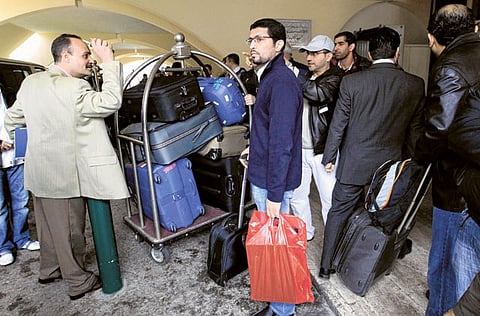Monitors in Damascus vow to pursue mission
League seeks political solution

Damascus: Gulf Arab monitors headed out of Syria yesterday after their governments said they were "certain the bloodshed and killing of innocents would continue", and the Arab League sought UN support for a plan to end President Bashar Al Assad's rule.
But their colleagues in Damascus pledged to pursue an observer mission, now extended until February 23, to verify Syria's compliance with an earlier Arab peace plan.
"The departure of the GCC [Gulf Cooperation Council] countries will not have an impact on the mission's work. We are all professionals here and we can do the job," said a senior Arab monitor, who asked not to be named.
"We were around 170 or so and now with them leaving we are around 120," the monitor said. "We need more monitors of course and more will come soon to replace those who left."
Monitors from Kuwait, the UAE and Bahrain left the Syrian capital and those from other Gulf states were expected to leave the Syrian capital soon.
Arab League chief Nabeel Al Arabi and Qatari Prime Minister Hamad Bin Jasem Al Thani, who heads the League's committee on Syria, wrote jointly to UN Secretary General Ban Ki-moon setting out the plan for a political solution in Syria.
The letter asks for a "joint meeting between them in the UN headquarters to inform the Security Council about developments and obtain the support of the Council for this plan," a League statement said.
Diplomatic cover
Several diplomats at the United Nations said France and Britain were working with Qatar and other Arab delegations on a new draft resolution supporting the Arab League plan.
The Arab League call for Al Assad to step down will raise pressure on Russia to explain why it is still blocking UN action to stop the bloodshed in Syria, where Moscow has called for a dialogue.
Syrian opposition groups have accused the observers mission, which began on December 26, of giving Al Assad diplomatic cover to pursue a crackdown on protesters and rebels in which more than 5,000 people have been killed since March, by a UN tally. The opposition Local Coordination Committees reported 68 deaths of civilians and army deserters on Tuesday. The Britain-based Syrian Observatory for Human Rights put the toll at 35.
Few remaining allies
The government says it is fighting foreign-backed Islamist "terrorists" who have killed 2,000 soldiers and police.
The state news agency Sana said 16 more were buried on Tuesday.
The revolt in Syria was inspired by others that have toppled three autocratic Arab leaders and the bloodshed has battered Al Assad's standing in the world, with Iran among his few remaining allies.
Foreign Minister Walid Mua'alem wrote to the Arab League accepting an extension of the monitoring mission, even as he scornfully rejected the 22-member body's call for Al Assad to hand power to his deputy and allow a new unity government to prepare for parliamentary and presidential elections.
"Definitely the solution in Syria is not the solution suggested by the Arab League, which we have rejected.
"They have abandoned their role as the Arab League and we no longer want Arab solutions to the crisis," Mua'alem declared on Tuesday.
Sign up for the Daily Briefing
Get the latest news and updates straight to your inbox



